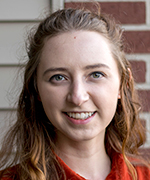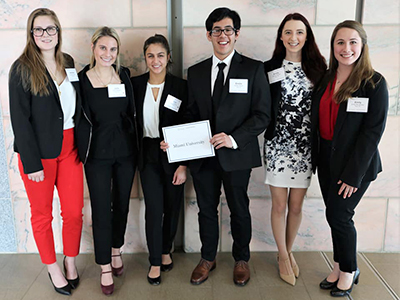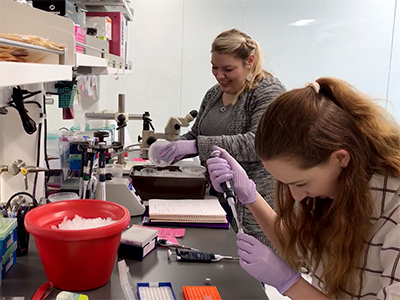
- honors junior Biology major
- minors in Bioinformatics and Comparative Religion
- from Oswego, IL
- Treasurer (2017-19) and future President (2019-20) of the Genetics Club
- Hughes Summer Internship recipient (2018)
- conducts neurobiology research on cricket behavior
- represented Miami in 2019 International Emory Global Health Case Competition
"There are a lot of options among all the different requirements among the Miami Plan, so just pick the ones that sound most interesting to you. When you're interested in the subject material, you're going to be more engaged and learn a lot more. When you take Miami Plan classes, you'll definitely find something that sounds a little different from what you do every day. Take risks and try your hand at new activities!"
Why Miami?

Emily Wyatt and her service dog friend attend a Miami hockey game.
"Coming from Illinois, I always wanted to go to college out of state to see new parts of the country. Miami has a really great research program, and knowing that I would be a biology major, getting involved in research was very important to me. And at Miami there really aren't any barriers to entry.
"I lived in Tappan Hall, which was one of the two Honors dorms for freshmen. It took me a while to get into the groove, but my first roommate was awesome. I had a lot of fun going to events like the Honors Formal, and I became an honors ambassador my first year, a position that I've continued to work in. Being a part of the Honors community truly helped me transition to college in a meaningful way, and I'm grateful for the experiences I've had with them."
Best Miami Experiences
"I used to think I wanted to go to medical school, but in high school I had the opportunity to hear a presentation on genetic counseling from a current student. Genetics was the main reason I was interested in biology, but I hadn't known how to pursue that interest until hearing her speak. Ever since then, I've been working towards a future as a genetic counselor.
"Genetic counseling involves talking to people about their genetic backgrounds. For example, a patient may be worried that they are genetically predisposed to cancer. So you draw up a family tree and find out which family members had cancer, what kind, at what age, what treatments they had, and so on. You can then talk with the patient to determine if a genetic test is right for them. If the patient decides to go through with testing, you help them order the best test for their situation and interpret the results for them after the test is done. If it turns out that the patient does have a genetic risk for cancer, you work with physicians to help advise them on the best types of preventative screenings or cancer treatments for their situation.

Emily Wyatt (second from right) poses with her teammates at the 2019 International Emory Global Health Case Competition.
"At Miami, I found a great research mentor in associate professor of biology Kathleen Killian, who helps head her department's neuroscience program. In her lab, my research focuses on how the fmr1 gene affects behavior and immune system functioning. Dr. Killian has also helped guide my plan to get an M.S. in genetic counseling after I graduate. Professor of biology Michael Robinson has also served two important roles during my time here at Miami: he taught my first genetics course, and he serves as the faculty advisor for the Genetics Club, which I've been involved in since my first semester.
"I also discovered my love for comparative religion, which I took as a required Miami Plan course — REL 333, taught by professor Liz Wilson. Her class was completely different from my usual science-focused courses, and the joy I found in that led me to begin taking other courses in the department. There are a lot of topics that are really interesting to me, even if they're not directly related to my career path."
Miami and the Liberal Arts
"I love learning how things work. It's crazy that there are things happening both all around you and inside you that are so small that we cannot see them happening — but these are things that make the whole world function. This is why biology, chemistry, and physics are particularly fascinating to me.
"Having started at Miami with my biology major already declared, my classes have laid down a strong foundation for my studies. Freshman majors take a year of general biology to get an overview, and then you can start to specialize. Research experience in addition to coursework helped me understand what goes on behind the scenes, to get to know material I learn in class in a more meaningful way.
"When it comes to other requirements from the Miami Plan, I don't think I would have discovered comparative religion (and declared a minor) without it! Miami's liberal arts requirements help you to broaden your horizons and find new things to be interested in. I've learned different skills in different courses, such as how to write and present more effectively. One of the most important skills you can have — in any career path — is effective communication. Taking classes in a broad range of subjects is extremely helpful in developing that skill."
Tracking Aggressive Behaviors of Crickets in a Neurobiology Lab

Emily Wyatt (foreground) and graduate student Mollie Sorrell doing lab work for their research.
"I applied for a job in Dr. Killian's neurobiology lab in the spring of my sophomore year. It was simple at first: cleaning out cricket cages, chopping up their food, and giving them water. During my semester there, I talked to the graduate students and Dr. Killian about what they were doing. One of their projects, on Fragile X syndrome, really jumped out at me.
Fragile X syndrome is a genetic disorder of the X chromosome that is the cause of some intellectual disabilities and has been associated with autism. In the lab, they were using crickets as a model organism to disrupt fmr1 gene activity and see how it affected their behavior. I asked Dr. Killian if a slot would be available for me in the fall, and she said she'd love for me to be on her research team. I dropped right in, learning lab techniques and different protocols, and I've been working on that project for two years now.
"One of the well characterized behaviors of crickets is aggression. We have little plexiglass arenas where we place adult male crickets to have behavior trials and use a scale to measure how aggressive they are with each other. Often they fight — though wrestling would be more appropriate, since they always come away unharmed. We take notes on who initiated the 'match,' how long the match takes, who wins, and other factors.
"I also do molecular biology research in the lab, where I help isolate RNA from cricket blood or brain tissue samples and manipulate it into a product we can use for our analyses. I have also worked on brain dissections under a microscope, which we then section into slices so we can stain them and examine the cells.
"My work in the lab inspired me to write a funding proposal for my 2018 Hughes Summer Internship, which enabled me to stay in Oxford for 10 weeks, working 40 hours a week on my ongoing project in Dr. Killian's lab. I presented results from my first year of research at Miami's annual Undergraduate Research Forum in April 2018 and from my second year in April 2019. I also obtained membership in the National Society for Neuroscience and attended their Summer 2018 Ohio Miami Valley regional conference!"
Advice to Students
"Get involved in research. You can simply begin looking at the variety of labs here at Miami, find out what professors are doing research and on what kind of projects, and determine what interests you. Once you find what you like, just try it — sign up and give it a shot for a semester.
"As for coursework, there are a lot of options among all the different requirements among the Miami Plan, so just pick the ones that sound most interesting to you. When you're interested in the subject material, you're going to be more engaged and learn a lot more. When you take Miami Plan classes, you'll definitely find something that sounds a little different from what you do every day. Take risks and try your hand at new activities!"
[April 2019]
 Miami University Oxford, Ohio est. 1809
College of Arts and Science
Miami University Oxford, Ohio est. 1809
College of Arts and Science
 Miami University Oxford, Ohio est. 1809
College of Arts and Science
Miami University Oxford, Ohio est. 1809
College of Arts and Science